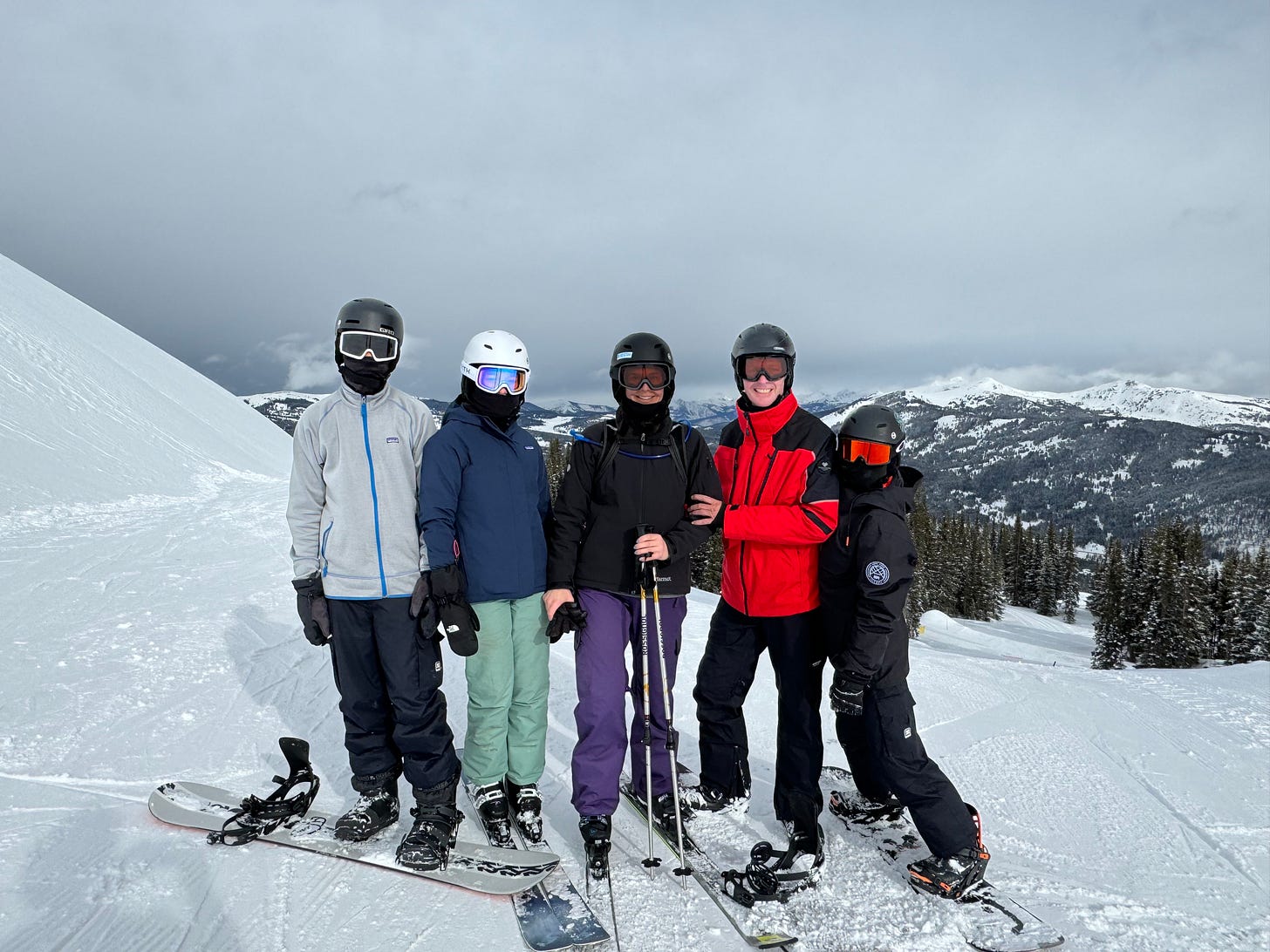Approaching Happiness
In our near-constant pursuit of happiness, how happy are we? And at times when we think we are happy, might we be settling for less?
Since this story involves a nun, two priests, an Arab, two Jews, and 'divine', perhaps best to set the table upfront. When it comes to religion, I’m with American President Abraham Lincoln, who said, “When I do good, I feel good. When I do bad, I feel bad. That’s my religion.” Except I would add, "When I do neither good nor bad, I pass up a precious opportunity to feel good." I don't like missing opportunities to feel good. Do you? And to me, the word 'divine' - and 'heavenly' - simply means the pinnacle of feeling good. We use these two words all the time to describe such elevated feelings and that which gives rise to them. Remember that breathtaking sunset mountain view or being moved to tears by the sight of a newborn child? At this pinnacle we feel a profoundly deep connection, awe, and joy in the presence of another. These divine feelings are at their highest peak when they arise where least expected, as evidenced by this Britain's Got Talent audition, with its surprising beautiful twists, amassing 150 million views.
On arriving from Ireland to the campus of a small private American university 38 years ago, I encountered, like me, countless other emotionally struggling teens. This was both surprising and confusing because, unlike me, their parents were still alive and by conventional measures "very successful." This confusion spawned in me a long intensive inquiry into our conventional notion of success and its relationship to happiness, grounded in two primary questions:
In our near-constant pursuit of happiness, how happy are we? And...
At times when we think we are happy, might we be settling for less?
Unhappy with my personal answers to these questions, four years ago I embarked on a life strategy of proximity with people on the margins of society. This strategy was inspired by Alabama death row defense attorney and justice advocate, Bryan Stevenson, and Holocaust survivor and psychologist, Edith Eger, both of whom seemed much richer than I felt in terms of what matters most in life. I was inspired too by my long-deceased parents, Ted, dentist to the poor of Limerick, who at a young age died in peace despite leaving behind a wife and 10 children he so cherished, and Úna, who traded in her affluent childhood lifestyle for a modest more proximate one with him. These men invited me to proximity and these women taught me the courage to embrace big change. And in this recent big change for our family, I got complete support from my wife Tori, who has been a constant source of patience and trust in this often restless and contrarian inquiry of mine.
As guests of PACEM, a local organization that provides shelter and services to homeless people, and a few local churches, Tori and I and our three children, Nora, Liam, and Ciaran, spent five evenings this month serving dinner to the homeless men of Charlottesville, and dining with them. One night is good, but over five nights together - thanks to Tori's proactive planning - we really began to know these men. Among them was Jerome, whose child attends high school with ours. At age 18 Jerome had a full athletic scholarship to university, but being in the wrong place at the wrong time in the projects of Richmond, he instead spent 18 years in prison. There was Leon, a Navy veteran who studied music there, and would have played trumpet for us all evening, if he had one. And we met Lionel, who knew of our friend William, who himself was once homeless and now runs the renowned Bridge Ministry addiction recovery community nearby. Lionel had read William’s memoir.
Buddhist nun Pema Chödrön says, "The measure of compassion lies not in our service to others, but in our willingness to see ourselves in kinship with them." Repeated proximity with all these men, through their eyes and their stories, the warmth of their hearts, and their beaming smiles of gratitude, helped us feel more in kinship with them. Twice since, our kids have enthusiastically reported at the dinner table seeing these men around town and engaging in familiar friendly conversation with them, and while sitting in my car at stop lights, I too have been greeted by some.
But not only these men. When Tori and I encountered a homeless man on the outdoor mall this week, who wasn’t among the PACEM group, it felt more natural to engage and buy him lunch. He was gruff and distant at first, but when Tori approached him later in the day on her own, he reached out to her with open arms inviting a warm hug. I’d like to think he was just waiting for me to be out of the picture, but suspect his mood swing had more to do with an empty belly becoming full, a humbling reminder that I have never felt real pangs of hunger. Of course, Tori responded to him in kind because open arms and warm heart are her superpowers, another inspiration to me, and our children, and as central a theme in this story as any.
Chödrön also says that “Compassion is not a relationship between the healer and the wounded. It's a relationship between equals.” And Jesuit priest Peter McVerry sums up beautifully how the wounded offer us such precious and priceless healing: “The poor and the homeless offer us the greatest gift that anybody can offer us. They invite us to open our hearts to include them in our love. And if we expand our hearts to include the poor and the suffering and the homeless, then we become more loving persons and therefore we become more fully human and therefore we become more fully divine.”
As I write, Nora, Liam, and Ciaran are high up in the mountains snowboarding and skiing, delighting at the pinnacle of what their Irish cousin Ted once dubbed “luxury sports.” Many would say they’re “living their best lives!” Are they? There are few things in life that I enjoy more than snowboarding and skiing. Yet in the spirit of poet Kahlil Gibran’s wisdom On Children, it is not my place to answer. When it matters most, they will each answer this question for themselves, perhaps guided by their children as they have been guiding their parents.
For a country founded on the pursuit of happiness, America seems quite lost in this pursuit and has been for some time. For long spells in my life, I’ve been lost too, and thanks to a toe in the water of proximity with loved ones on the margins, in keeping with Abe Lincoln’s religion, I already feel more good and more divine than ever. Remember, the emphasis here is not on being good (moral), but feeling good (joyful), the latter being so much more inviting and contagious, and in my view, true to the original intent of the more prominent religions, each of which now guides me in its own unique way. To be clear, the intention here is not to downplay the tragedy of homelessness and the profound hardships of people on the margins, but to highlight for those of us in the mainstream the profound heartfelt benefits of engaging directly with people on the margins and working side-by-side to eliminate avoidable social tragedies.
It appears our three children still have many frequent feelings of good and divine, and this in itself is a beautiful gift. I was already quite lost at their age, as are many. But when they grow and get lost, and they will, because we do, perhaps conforming to the norms of a country still lost, I hope their childhood memories of feeling good and divine where they least expected it will remind them of this less-travelled path to happiness. At times this approach to family life makes for bumps in our journey together, but at least now they more clearly understand their parents' intent, and at each bump, we're all doing our best to land on both skis.
To those here who might say we’re taking a risk with our children, unnecessarily exposing them to the homeless, the suffering, former prisoners and addicts, some of whom are now family friends, I’d say we’re just taking a different risk, since no family strategy comes with a guarantee. But we’d rather take a risk that invites us to joyful relationship with people who feel familiar to us and people who seem very different, a strategy that reminds us firsthand of the "unshakable goodness in everyone - no exceptions," to quote another Jesuit priest on the margins, Greg Boyle. Seeing more clearly the goodness in all people helps one see more clearly the goodness in self, and vice versa. It's such an uplifting cycle, making for less emotional struggle, and who knows, in some small way, this family's strategy might even help our country feel a little more happy.







Loved this post, Chris! Great to see you here!